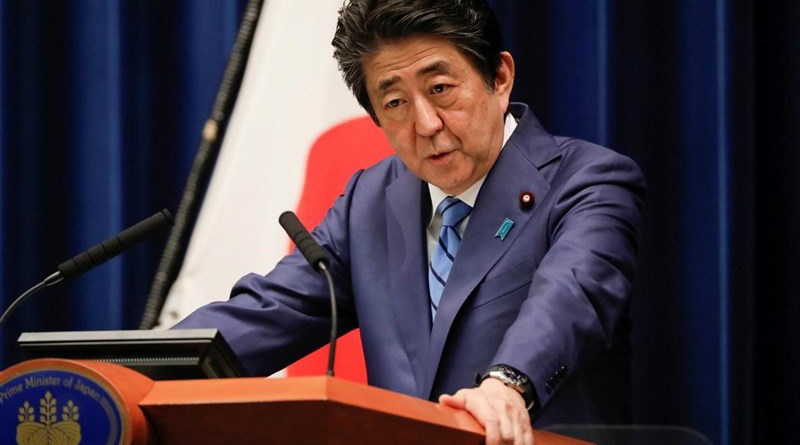What Next For Japan If Abe Decides To Say ‘Sayonara’? – Analysis
Japanese Prime Minister Shinzo Abe underwent a medical check-up this week at Keio University Hospital in Tokyo amid concern about his health. Abe has been in office since 2012 and is Japan’s longest-serving prime minister. It is his second stint in the job; he resigned from his first term in 2007, after a year in power, revealing that he was suffering from ulcerative colitis.
If he does step down, therefore, it would not the first time he has done so. Last time, however, the world was a very different place, on the cusp of an economic meltdown. For now, it seems that Abe is delegating his regular duties to others, allowing him to focus on his health and matters of state.
While there are no reports that he is unable to perform his duties, should that be the case, Deputy Prime Minister Taro Aso, who is also Japan’s finance minister, would be the temporary replacement until the next elections.
But any new leader would have to deal with the fallout from a record fall in Japan’s GDP between April and June, which was even worse than what was experienced during the 2008 financial crisis.
The reversal of gains that had been made by a series of controversial economic reforms Abe introduced, known as “Abenomics,” showed that the pandemic has caused an economic “snapback” and Tokyo is going backward. In addition, the government is dealing with flooding across much of the south, fractious relationships with neighboring countries and uncertainty about bilateral ties with the US.
Japan has been badly affected by COVID-19. The 2020 Olympics were postponed and factory production significantly disrupted. Tokyo is experiencing a spike in coronavirus cases in a resurgence that appears to be a second wave.
Abe appears to be losing the pandemic battle, unable to implement effective preventative countermeasures to protect public health because a higher priority is placed on boosting socioeconomic activity. Sound familiar? This strategy can be seen around the globe, where governments have judged that the economic peril outweighs the risks posed by the spread of the pathogen and the resulting human cost to health. Crisis management is key. With Abe perhaps leaving the prime minister’s office soon, there might be hope for some quick and bold decision making.
Prospective leaders are already starting to position themselves as possible replacements, with Foreign Minister Toshimitsu Motegi attracting positive attention as a potential successor during visits to Singapore, Malaysia and the UK. He continues to place importance on meeting his peers in person, despite the pandemic, and has earned praise for his negotiating skills and an ability to get things done. Yet, that style might be seen by some Japanese power brokers and constituents as ignoring safety concerns. Shigeru Ishiba, a former defense minister and long-time critic of Abe’s policies, is also considered someone who can get things done.
Whatever happens, the coming months will prove crucial for Japan’s domestic and foreign policies. Fate will play a part, as Abe might decide to remain in power until next year. He might consider a Cabinet reshuffle to inject some new blood and ways of thinking, or call a snap election.
It should be pointed out, however, that Abe “owns” the issues surrounding COVID-19 management and the Tokyo Olympics. The sporting showpiece might be further delayed beyond next summer, or have its schedule adjusted. Whatever happens, how Japan manages the massive event and its participants will be key. The complexities of hosting it in the current climate are being considered, with safety in mind, and how other mass-crowd events have been handled is being examined.
Whoever is in charge in the months ahead will face a difficult task and some tough policy decisions. With the next presidential election due in September 2021, what happens next is important for the nation’s political dynamics.
The ramifications of a possible Abe resignation next month also changes some of the complexities of the security requirements in the region at a time of heightened tensions. The US is increasing its challenge to China and, combined with Hong Kong’s national security law plus the tensions between South and North Korea, Tokyo once again finds itself in the middle of a very tough neighborhood that is racked by rising tensions and bellicose language. COVID-19 is making matters worse by placing pressure on the governments of Northeast Asia to secure their countries against threats.
The US administration is also making things difficult for Japan by placing a price on security during this time. With COVID-19 so prevalent and projected to persist, there is every reason not to pursue such policies in the economic and trade arenas.
The US-Japan relationship is an important factor in the region as Tokyo expands its military reach by contributing to maritime operations beyond the Pacific Ocean. Joint US-Japan military exercises continue in the Indo-Pacific theater, marking 60 years of cooperation and helping to keep the bilateral relationship healthy and active. But the reality in the political realm is very different.
If Abe steps down and says “sayonara,” Japan will enter a period of questioning what lies ahead for the country and its economic recovery in a troubled security environment.

